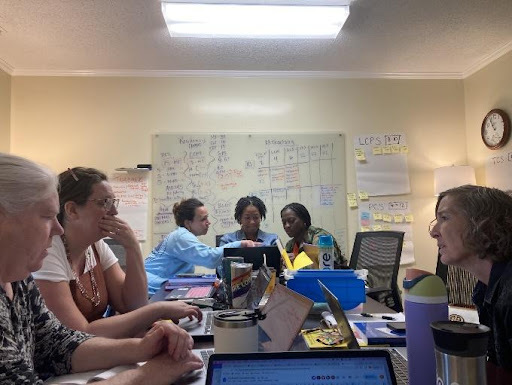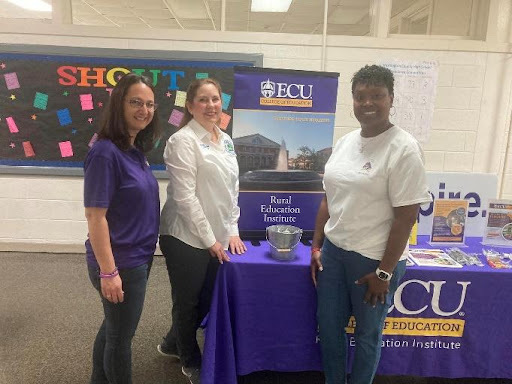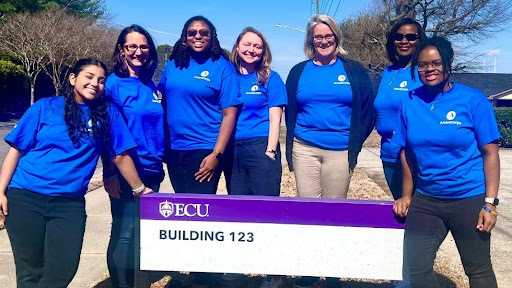Located in Greenville, North Carolina, East Carolina University (ECU) was founded as a teacher training institute, and has served the rural communities in the region ever since. Over time, ECU grew to be a leading voice for rural education across the state through their Rural Education Institute (REI). Now, through this new partnership with Rural Schools Collaborative, the REI team is excited to work together with RSC and the Hub Network to elevate the voices of rural educators in North and South Carolina as the Southeast Hub.

The REI’s work is expansive, but it all points back to the institute’s mission of “initiating and facilitating partnerships and research-driven innovations in schools and communities.” REI positions itself as an easy-to-access and friendly collaborator with local education stakeholders of all shapes. The hope is that by providing a space for rural education voices, perspectives, and innovations to thrive, that REI and its local partners can together strengthen the educational outcomes of rural students, schools, and communities.
REI works locally in four primary ways:
ECU Next Gen: a teacher pathway program that seeks to cultivate the next generation of rural educators and researchers.
Local and Regional Development: seeking to build up the capacity of rural places by collaborating with schools and communities.
Rural Education Promotion: articulating and advocating the importance of rural schools and communities.
Research and Evaluation: studying our practice and investigating what works in rural schools.
Dr. Kristen Cuthrell, Director of REI reaffirms the great value rural schools and communities possess, and shares how this new Hub partnership will play a central role in her team’s work to elevate that value: “I am committed to our rural schools and communities and value the opportunity to partner in all ways across our region. That is the vision I see for this newest Regional Hub: creating shared space for elevating our region’s collective knowledge, experiences, and commitment to rural places and spaces.”
That sense of coming together to do what each does well, and to grow together, is widely felt by the faculty at REI. Dr. Robert Quinn, an Associate Professor of Art Education at ECU, underscores how coming together is quintessentially rural, and something that excites him in this work: “Rural is certainly a geographic distinction, but it is also much more than that. Rural is a frame of mind and a way of being whereby people adapt to geographic remoteness by forming communities to promote flourishing of those who live in these communities.” Dr. Cuthrell agrees, showing how she and her team intend to carry this same sentiment nationally with the larger RSC Hub Network. “There is much we can learn and share with each other,” she says. “I’m looking forward to the connections and collaborations. We all have something to share.”

Some of what the REI team is eager to share are the experiences and learnings of several high-impact rural-focused programming ECU has been fortunate enough to sustain. One program is an innovative educator preparation program called edPIRATE (Educator Pipeline in Rural Action for Teaching Equity). The initiative is an MAT (Master of Arts in Teaching) program that prepares K-8 teachers specifically for communities in rural eastern North Carolina through a 13-month residency program. During their residency, teachers-to-be are immersed in a justice-oriented curriculum focused on the specific needs and realities of rural communities. A step further, the program also trains school administrators on topics around rural educational justice.

In addition to concepts of service and justice in the education profession, the CARE Corps program strives to create an equitable and resilient school ecosystem as well. CARE (Collaborative Action in Rural Education) is an Americorps program that offers tutoring, teaching, and mental health support services for youth and families across eastern North Carolina. Over the course of a year, CARE Corps members will serve over 4,000 students, offering a positive influence on students’ mindset, social-emotional skills, and academic success. Patricia Hopkins, Associate Director of the CARE Corps program, shares that “rural work is ingrained within me, as I grew up in a rural community and attended rural schools. Rural means home, rural is comforting, nurturing, familiar, and love. Rural is the heart of the people. I am looking forward to helping others understand and recognize the strengths, uniqueness, and positive impact of rural places and communities. Partnering with RSC will help convey our overall message: #Rural Matters.”

Student and teacher social-emotional health is a core interest for ECU and REI. Along with a pathway for training and retaining rural counselors, the University also supports an effort called Project Don’t Wait, a school-community-university partnership focused on disaster mental health preparation and response. In just two years, Dr. Loni Crumb, Associate Professor of the Counselor Education Program, reports that ECU facilitated 30 different workforce development trainings around the topic of mental health, drawing nearly 1700 participants. Additionally, they organized and hosted a rural disaster mental summit, drawing over 200 participants from across the region.
The impacts of all these programs are widely felt in the rural communities REI serves, even by ECU faculty themselves. Dr. Bethany McKissick, an Associate Professor in the department of Special Education, Foundations, and Research, notes that she is excited to be able to collaborate with REI to support rural schools. “I live in one of the rural districts that partner with REI in this work,” she points out, “and I am excited to get to know my children’s future teachers and establish a relationship of support. Because I am a member of this community, and my own children will benefit from growing their teachers’ knowledge and skills, I am very excited to see all the wonderful things that will come from this.”
Along with these, REI is proud to support a number of other efforts, such as a touring education workshop, participation in a homegrown leaders program, becoming the National Rural Education Association state affiliate for North Carolina, developing an asset-based ideological framework centered on Rural Cultural Wealth, and publishing the Theory & Practice in Rural Education journal. Through these programs and much more, REI has an exemplary legacy of supporting and sustaining strong rural schools. The Rural Schools Collaborative team is overjoyed to be coming together with East Carolina University and REI to further our shared work in building vibrant rural places centered around thriving community schools.





